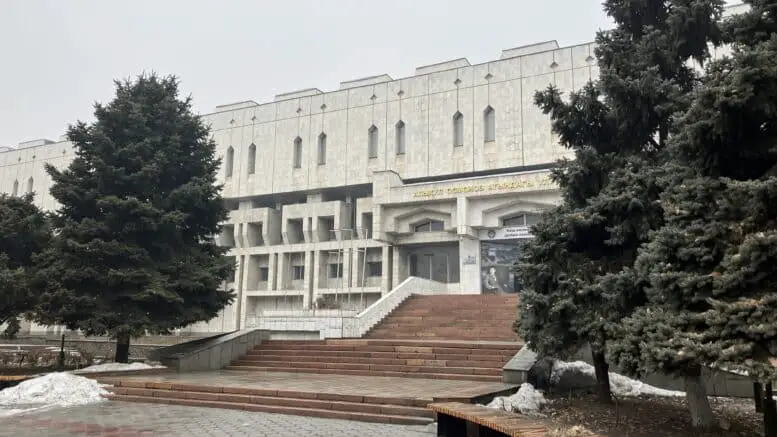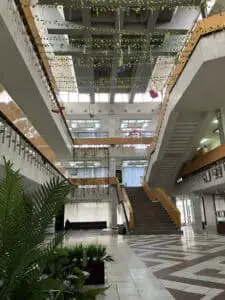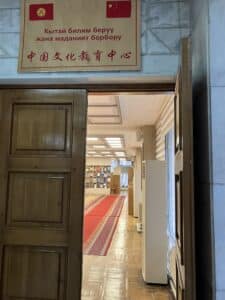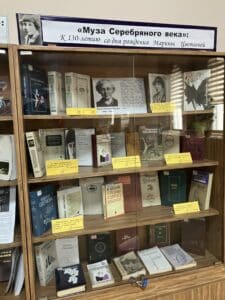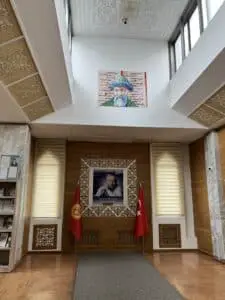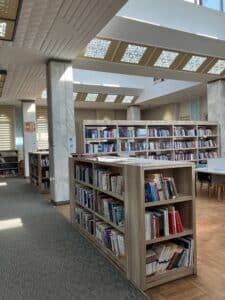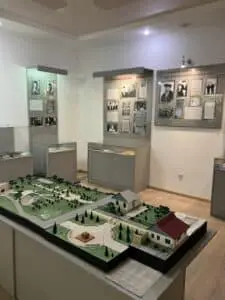In 1934, the National Library of Kyrgyzstan was formed following the merging of the Frunze City Library and the Library of the Council of People’s Commissars. Starting with just 16,000 publications at its opening, the library is now home to over six million documents in 89 different languages, ranging from encyclopedias and reference manuals to classics and contemporary novels.
The main collections include references and bibliographic publications (encyclopedias, dictionaries, reference manuals, etc.), culture and art (publications related to theater, cinema, art, architecture, etc.), legal information (Kyrgyz and international law, democratization, human rights), foreign-language literature, and Kyrgyz literature and rare and special publications (Arabic, Latin, and Cyrillic manuscripts dating back to the 16th century) and the archive (publications printed in Kyrgyzstan).
The National Library of Kyrgyzstan has three main floors, each encircling a wide open center where the main staircase is located. The first floor is primarily dedicated to reception. A help desk stands to the right of the entrance, and straight ahead is a children’s corner and the registration office, where one can purchase a visiting pass. All visitors must have a permanent library ticket (постоянный читательский билет) or a temporary visitor’s pass (читательский пропуск). Only those with proof of permanent residence qualify for the permanent library ticket. Single-day passes cost 10 som, and three-year passes cost 100 som. Both the latter require presentation of ID documentation (passport) and one’s Bishkek address.
- View from first floor at the National Library of Kyrgyzstan
- Center of Chinese Education and Culture
- Display of Russian authors and poets in the Center of Russian Literature and Culture
The second floor is lined with rows of index card drawers for filing materials and also features the Alykul Osmonov Museum, dedicated to the museum’s namesake. Osmonov (1915-1950) was a Kyrgyz poet, dramaturg and translator who made a monumental impact on Kyrgyz literature by being one of the first to transcribe Kyrgyz poetry from the oral tradition onto paper. He also wrote original poems and translated foreign poetry such that from Alexander Pushkin into the Kyrgyz language. Alykul Osmonov was posthumously awarded the Lenin Prize, and in 1980 the Alykul Osmonov Literary Prize was created in his honor, now considered one of the most prestigious literary prizes in Kyrgyzstan. The library museum features biographical information, photographs, samples of his poems and works of translation, a miniature of his childhood village complex, and a replica of his desk and workspace.
Continuing on through the second and third floors, one inevitably comes across the many foreign-funded cultural centers, such as the Center of Chinese Education and Culture, the Kyrgyz-Turkish Chingiz Aitmatov Center, and the Center of Russian Literature and Culture. These centers showcase the works of national authors and offer quiet workspaces with plenty of desks. I found other sections of the library, such as the conference rooms and smaller browsing sections, a bit forbidding, as many were devoid of people and there seemed to be strict rules about who can enter where. However, after overcoming my initial sense of uncertainty, I found my favorite spot in one of the cultural centers, the Kyrgyz-Turkish Chingiz Aitmatov Center. There, sunlight streams through the skylights to illuminate a colorful collection of books, free wifi is available, and students are scattered about the multitude of individual- and group-sized tables. Facing the various registration procedures and navigating the library in a foreign languages can be intimidating, but discovering its various nooks-and-crannies is well worth it.”
- The Kyrgyz-Turkish Chingiz Aitmatov Center
- The Kyrgyz-Turkish Chingiz Aitmatov Center
- Alykul Osmonov Museum at the National Library of Kyrgyzstan
General Information:
Address:
Abdrakhmanova Street, 208
Bishkek, Kyrgyzstan
(Кыргызстан, г. Бишкек,
ул. Абдрахманова 208)
General working hours:
Every day 9am-6pm
Summer hours (July 15 – September 15):
Monday-Saturday 9am-6pm, closed on Sundays
Phone number:
+996 (312) 30-46-75


